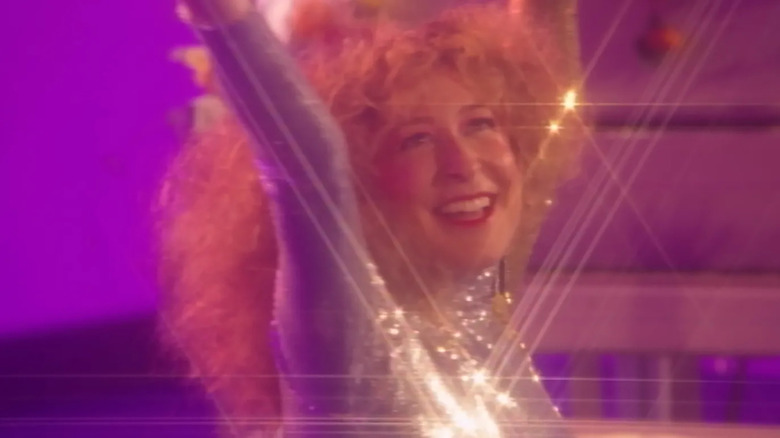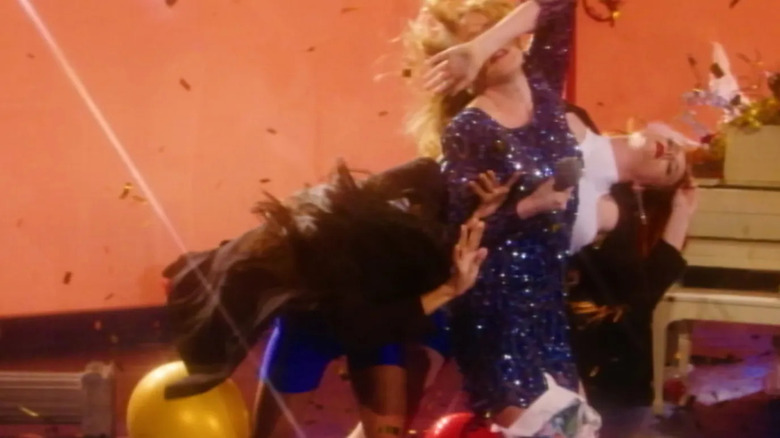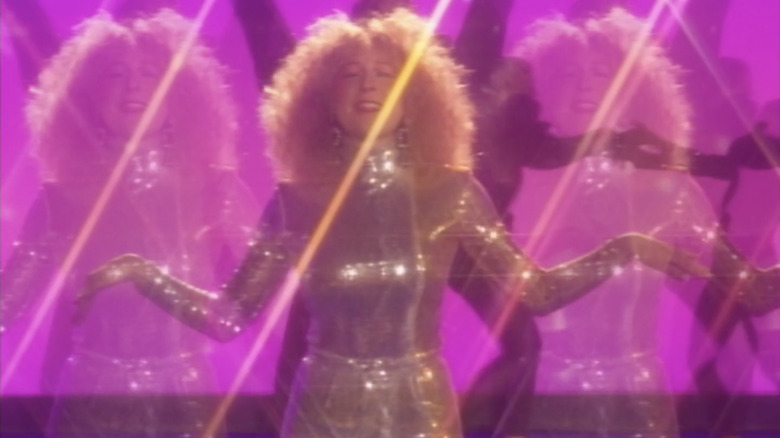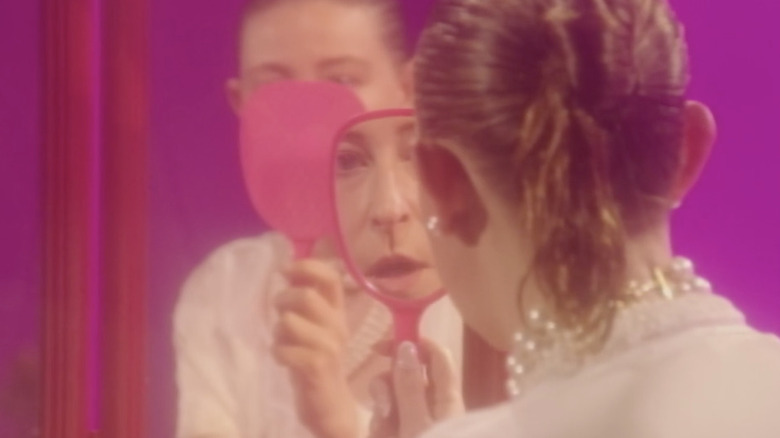Give Me Pity! Review: Going Straight For Your Throat On Demand
When the curtain rises on Sissy St. Clare's Saturday night television special — the one she has desperately coveted for so long now — she's frank with the audience about the realities of "making it." It's no easy feat, but a girl like her isn't going to stop for anything. As her wide-eyed, brightly smiling optimism bleeds through the show's catchy opening number "I'm Making It" — punctuated by the repeated lyric "Going straight to your heart on demand!" — she tells the audience that she has so much planned for them, including stakes that go "higher and higher and higher." It tapers off and she launches into a monologue that becomes a covenant with the audience, promising them that the special won't end until she's "bashed in" and "begging each and every one of you to set me free."
As she moves back into the happy-go-lucky world of dancing and singing and "making it," the picture distorts, building up into something unnerving and almost demonic. Sissy notices a man on the periphery, a man in a mask who is stalking the set as she performs, and it fills her with visible dread. This is how we enter the story of "Give Me Pity!," the new film by director Amanda Kramer, who gave us "Please Baby Please."
The dance with martyrdom
Sissy's journey is certainly that of a hero, a tragic one no doubt, and the special takes her through the varied trials and tribulations one might face in the quest for stardom — and that's before we even start to consider the man quite literally invading her set. It's rare that a new allegorical story is so tight and well-formed, and that it takes on the stakes necessary to be effective. Sophie von Haselberg understands the ethos of the variety performer so intrinsically that she loses herself not just within the idea of making it, but in the demands of being the host of a beloved television special. She understands what this character demands and sprints at it full-force, taking Sissy's opening monologue to heart and running herself ragged in service of the art. It is the sacrifice demanded by making it, and not only does Sissy give it willingly, but so does Von Haselberg.
As the film teeters unsettlingly into the third act with the star's uncanny sketches and the ever-pervading presence of something rotten, the audience comes to realize that the masked man represents the price of fame, and the film does this incredible dance with martyrdom. The movie's central twist surprises us — we thought we knew how far Sissy would go to make it, but Kramer's choices take that concept to a whole new level, yet one woefully familiar to the story of selling out or even just the realities of celebrity in general.
The brutality and vulnerability of fame
The segment — as the night is aptly broken up into segments like any self-respecting television special would — is harrowing and well-acted, putting a spotlight on the moment when we betray ourselves in service of our ambitions. There will always be two parts of us in those moments: the part that can't believe we would, and the other part that has been dying to all this time. Von Haselberg oscillates between them impeccably, shoving both the brutality and vulnerability of fame in our faces in the wordless yet achingly loud climax of the film.
When we meet Sissy in the movie's opening, she is dressed in white, overtly showing off the symbolism of her newness and purity. The true beginning of her quest to be known. She talks about how she and Jesus are alike, both on a mission to be known, and how he was able to put his own twist on his "act" by making a comeback. In her own bastardized way — the way that conventional contemporary celebrity forces upon us — Sissy becomes Jesus after his twist in the film's final act, giving the character a bleak yet relatable arc.
In fact, the film subtly questions if Jesus' comeback was simply a vehicle to reach infamy. It's smart, insightful writing from Kramer put into practice beautifully by Von Haselberg, but it doesn't just show in the film's overall theme. These key elements are the pulsing heart of the picture's runtime, from beat to beat. Each choice Von Haselberg makes—guided by Kramer's witty and wise script—is in service of a lofty goal, but she makes it a point to suffer along the way. In this demented journey, Sissy's Christ-like persona is cemented.
And I'm making it...
"Give Me Pity!" is overarchingly beautiful to look at, with this golden haze permeating throughout the special's set making it feel like a dream in its best moments. When the distortions come in, that comfortable, welcoming atmosphere is warped and maimed into something sinister and altogether wrong. It's a stunning visual for the ugly side of show business, and how it seems to creep up on you, ever-watchful and omnipotent in its hold on us all. Sooner or later, it'll seep into your skin, and the visuals Kramer imposes on the audience are assaulting enough to make us feel like we're vulnerable to it too, just watching.
By the end of the film, it feels like Sissy — and in turn, the audience — has been trapped in this place, a place where this television special goes on forever. The quest to make it goes on forever, playing on an infinite loop. This film is intentionally exhausting because it wants you to feel the way Sissy feels as the special concludes: chewed up, spit out, used, abused, martyred for something you thought could love you back. Everyone uses the artists, which is why the starlet doesn't make it by the end. But she dived in headfirst willingly, and achieved what she set out to achieve, no matter the cost. Taking the ride with her was more than worth it, but whether or not she feels the same, we'll never truly know. Ah, fame.
/Film Rating: 8.5 out of 10



